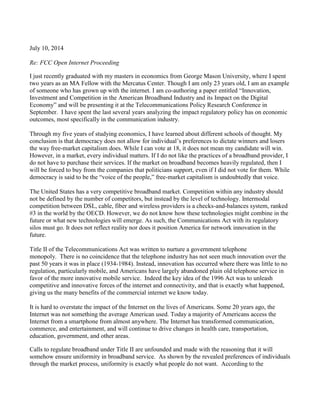
Fcc open internet proceeding michael horney
- 1. July 10, 2014 Re: FCC Open Internet Proceeding I just recently graduated with my masters in economics from George Mason University, where I spent two years as an MA Fellow with the Mercatus Center. Though I am only 23 years old, I am an example of someone who has grown up with the internet. I am co-authoring a paper entitled “Innovation, Investment and Competition in the American Broadband Industry and its Impact on the Digital Economy” and will be presenting it at the Telecommunications Policy Research Conference in September. I have spent the last several years analyzing the impact regulatory policy has on economic outcomes, most specifically in the communication industry. Through my five years of studying economics, I have learned about different schools of thought. My conclusion is that democracy does not allow for individual’s preferences to dictate winners and losers the way free-market capitalism does. While I can vote at 18, it does not mean my candidate will win. However, in a market, every individual matters. If I do not like the practices of a broadband provider, I do not have to purchase their services. If the market on broadband becomes heavily regulated, then I will be forced to buy from the companies that politicians support, even if I did not vote for them. While democracy is said to be the “voice of the people,” free-market capitalism is undoubtedly that voice. The United States has a very competitive broadband market. Competition within any industry should not be defined by the number of competitors, but instead by the level of technology. Intermodal competition between DSL, cable, fiber and wireless providers is a checks-and-balances system, ranked #3 in the world by the OECD. However, we do not know how these technologies might combine in the future or what new technologies will emerge. As such, the Communications Act with its regulatory silos must go. It does not reflect reality nor does it position America for network innovation in the future. Title II of the Telecommunications Act was written to nurture a government telephone monopoly. There is no coincidence that the telephone industry has not seen much innovation over the past 50 years it was in place (1934-1984). Instead, innovation has occurred where there was little to no regulation, particularly mobile, and Americans have largely abandoned plain old telephone service in favor of the more innovative mobile service. Indeed the key idea of the 1996 Act was to unleash competitive and innovative forces of the internet and connectivity, and that is exactly what happened, giving us the many benefits of the commercial internet we know today. It is hard to overstate the impact of the Internet on the lives of Americans. Some 20 years ago, the Internet was not something the average American used. Today a majority of Americans access the Internet from a smartphone from almost anywhere. The Internet has transformed communication, commerce, and entertainment, and will continue to drive changes in health care, transportation, education, government, and other areas. Calls to regulate broadband under Title II are unfounded and made with the reasoning that it will somehow ensure uniformity in broadband service. As shown by the revealed preferences of individuals through the market process, uniformity is exactly what people do not want. According to the
- 2. International Telecommunication Union, the US ranks in the top ten of countries in the world for affordability for entry level fixed and mobile broadband. As stated above, Americans can choose broadband in a variety of ways: DSL, cable, mobile, satellite, WIFI and so on. In my paper, I reiterate data from the Federal Communications Commission and National Cable and Telecommunications Association describing the following: • 97 percent of American households have at least two providers for fixed broadband • 85 percent of American households have access to networks capable of 100 Mbps • 82 percent of Americans have at least four wireless providers. This is a success story that should be celebrated and encouraged. There is no market failure. If any further evidence is needed, look at the Europe Union. Many countries in the EU have made this utility style broadband experiment over the last decade. The result is a decline in investment and next generation access coverage. The US comprises only 4 percent of the world’s population, yet Americans have enjoyed one-quarter of the world’s investment in broadband infrastructure over the past decade. Meanwhile, the EU, with a population approximately two-thirds larger than the US, has fallen from one-third to one-fifth of the world’s broadband investment over the same period. One of the most important aspects of regulatory policy in any industry that I have learned is the benefits of an ex post regime over an ex ante one. In other words, competition is almost always better than regulation. Regulation has inherent costs, so in competitive industries, of which telecommunications is, it makes more sense to wait for evidence of harm before acting. It brings to mind the old cliché, “If it ain’t broke, don’t fix it.” Lately, net neutrality advocates, Congressional representatives and even FCC commissioners have used scare tactics about problems that could potentially occur if a market/industry is not heavily regulated. This is a form of manipulation of their public position that flies in the face of the evidence of the many capital intensive industries that have transitioned from sector-based regulation to competition regimes. Communications is unquestionably competitive, and can now be governed by competition law, not sector-specific regulation. In market-based industries, the consumer gets what he/she pays for. Not all cars are the same price, nor should broadband service be. Markets can correct themselves through competition, whereas regulations can only be corrected with more regulation. Additionally, consumers today are more empowered than ever. The many tools of the internet brought to us through an innovative and competitive industry allows consumers to bring a company to its knees. Thank you for your consideration. Sincerely, Michael J. Horney
